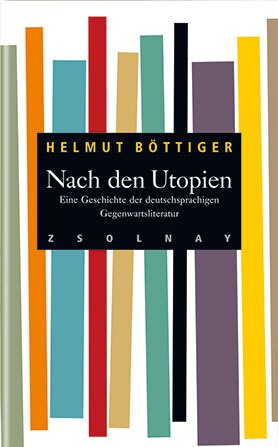Helmut Böttiger
Nach den Utopien. Eine Geschichte der deutschsprachigen Gegenwartsliteratur
[After the utopias. A history of contemporary German-language literature]
- Paul Zsolnay Verlag
- Vienna 2004
- ISBN 3-552-05301-8
- 301 Pages
- Publisher’s contact details
Helmut Böttiger
Nach den Utopien. Eine Geschichte der deutschsprachigen Gegenwartsliteratur
[After the utopias. A history of contemporary German-language literature]
Sample translations
Review
Writers “At the Helm” and “Journalists”, “Humor and Melancholy”, “Knowledge, Emptiness, and I”: Helmut Böttiger’s history of literature with the suggestive title After the Utopias treats all these phenomena present in contemporary German-language literature. And just as the chapter titles above make one curious about what each of them may reveal, it is the special merit of Böttiger’s overview of the exponents and tendencies of present German-language fiction and poetry that it is likewise able to arouse one’s curiosity about the writers in question and their work and awaken one’s interest to re-read familiar authors and even discover new ones.
For by no means does Böttiger only examine the >familiar faces< such as Günter Grass, Christa Wolf, or Martin Walser. In his literary history, Böttiger also considers many authors of subsequent generations, some of whom may be less well-known today, though no less interesting. We thus find such authors as the East German, Fritz Rudolf Fries, and Thomas Strittmatter, the >regional writer< who died at an early age. Strittmatter is also the only exception to Böttiger’s criteria, formulated in the introduction, of selecting “living authors whose work is already recognized and whose names will continue to be known in twenty years.”
Böttiger subtitles his cross-section of fiction and poetry: “A History of Contemporary German-language Literature”. The indefinite article here underscores the book’s general intention since Böttiger makes no claims that his selection of authors is either complete or universally objective. Instead, he wishes to portray over thirty contemporary writers whom he feels to be important. For Böttiger, these writers each represent in their own way German-language literature of the years 1989-2002, the German reunification quite clearly marking the beginning of the titular era After the Utopias, an epoch which has lasted until today.
In his introduction entitled “What is Criticism”, Böttiger, who has arranged his history of present-day German-language literature into individual essays on each writer, openly confesses the “subjectivity of the author” to have been the guiding principle in his selection of writers. Yet as a reader, one readily endorses the subjective decisions of this experienced literary critic and long-standing editor of the newspapers Frankfurter Rundschau and Tagesspiegel. Böttiger’s choice of authors reveals a sound understanding for what makes these writers exemplary and relevant beyond the immediate present.
As different as these representatives of contemporary German-language literature may be in terms of their themes, their conflicts with everyday Germany, and their focus on style, and though Böttiger, in acknowledging their work through his insightful and nuanced essays, succeeds in clearly delineating the specific nature of their writing, these individual essays together form a mosaic and address the central issues of this book: “What characterizes contemporary writing? What makes it unique? What types of form and language are at the writers’ disposal?”
In his literary history, Böttiger consciously avoids over-generalizations and rigid systematizing. Wherever appropriate, however, he does make reference to other authors and will call attention to the similarities and differences between, for example, Peter Handke and Botho Strauss, or Markus Werner and Max Frisch. These signposts, as it were, orientate the reader through the German literary landscape of the last fifteen years. Böttiger pleasantly refrains, however, from making wholesale judgments and declaring the latest –ism. Instead, Böttiger always foregrounds the unique quality of each author’s writing.
Böttiger approaches the individual objects of his “History of Contemporary German-language Literature” with great discrimination. In each of the essays, which may be read in any order, the reader senses the care with which Böttiger examines how, in their work, the authors reflect upon the recurrent theme of the “dissolution of the bourgeois subject” and how they portray this subject’s “awareness of emptiness” in their texts.
In his book, Böttiger makes it clear that he does not intend to take all writers into account who have played an important role in German-language literature in the last one-and-a-half decades. Instead, he hopes to mirror the diversity of this literature by devoting the same amount of energy to such phenomena as the pop poetry of Thomas Meinecke and the “Wunder-Girls”, young women writers such as Judith Hermann, as he does to prominent figures like Wilhelm Genazino, Durs Grünbein, and Herta Müller.
In his panorama of contemporary German-language literature, Böttiger likewise considers new categories of writing. In “Polyglot Heads”, Böttiger surveys writers working in German who feel equally comfortable in another language and culture. Here the reader finds Feridun Zaimoglu and Emine Sevgi Özdamar, two authors of Turkish descent, the Hungarian Terésia Mora, and Andreas Schäfer, of a German-Greek family. These writers with a multicultural background enrich German-language literature through their “sounds and colors, which point towards the future”.
Over the course of this stimulating and enjoyable book, the reader can thus discern many essential developments and tendencies of German-language literature since the fall of the Wall. It will be interesting to see which of the writers selected by Böttiger for their present importance will in twenty years still be considered to have played a prominent role in shaping their era, and which ones will have provided only impulse for the current literary discourse. For with his intelligently written book Böttiger has clearly demonstrated that all of the authors collected here are of central importance for the development of German-language literature at the outset of this millennium.

For by no means does Böttiger only examine the >familiar faces< such as Günter Grass, Christa Wolf, or Martin Walser. In his literary history, Böttiger also considers many authors of subsequent generations, some of whom may be less well-known today, though no less interesting. We thus find such authors as the East German, Fritz Rudolf Fries, and Thomas Strittmatter, the >regional writer< who died at an early age. Strittmatter is also the only exception to Böttiger’s criteria, formulated in the introduction, of selecting “living authors whose work is already recognized and whose names will continue to be known in twenty years.”
Böttiger subtitles his cross-section of fiction and poetry: “A History of Contemporary German-language Literature”. The indefinite article here underscores the book’s general intention since Böttiger makes no claims that his selection of authors is either complete or universally objective. Instead, he wishes to portray over thirty contemporary writers whom he feels to be important. For Böttiger, these writers each represent in their own way German-language literature of the years 1989-2002, the German reunification quite clearly marking the beginning of the titular era After the Utopias, an epoch which has lasted until today.
In his introduction entitled “What is Criticism”, Böttiger, who has arranged his history of present-day German-language literature into individual essays on each writer, openly confesses the “subjectivity of the author” to have been the guiding principle in his selection of writers. Yet as a reader, one readily endorses the subjective decisions of this experienced literary critic and long-standing editor of the newspapers Frankfurter Rundschau and Tagesspiegel. Böttiger’s choice of authors reveals a sound understanding for what makes these writers exemplary and relevant beyond the immediate present.
As different as these representatives of contemporary German-language literature may be in terms of their themes, their conflicts with everyday Germany, and their focus on style, and though Böttiger, in acknowledging their work through his insightful and nuanced essays, succeeds in clearly delineating the specific nature of their writing, these individual essays together form a mosaic and address the central issues of this book: “What characterizes contemporary writing? What makes it unique? What types of form and language are at the writers’ disposal?”
In his literary history, Böttiger consciously avoids over-generalizations and rigid systematizing. Wherever appropriate, however, he does make reference to other authors and will call attention to the similarities and differences between, for example, Peter Handke and Botho Strauss, or Markus Werner and Max Frisch. These signposts, as it were, orientate the reader through the German literary landscape of the last fifteen years. Böttiger pleasantly refrains, however, from making wholesale judgments and declaring the latest –ism. Instead, Böttiger always foregrounds the unique quality of each author’s writing.
Böttiger approaches the individual objects of his “History of Contemporary German-language Literature” with great discrimination. In each of the essays, which may be read in any order, the reader senses the care with which Böttiger examines how, in their work, the authors reflect upon the recurrent theme of the “dissolution of the bourgeois subject” and how they portray this subject’s “awareness of emptiness” in their texts.
In his book, Böttiger makes it clear that he does not intend to take all writers into account who have played an important role in German-language literature in the last one-and-a-half decades. Instead, he hopes to mirror the diversity of this literature by devoting the same amount of energy to such phenomena as the pop poetry of Thomas Meinecke and the “Wunder-Girls”, young women writers such as Judith Hermann, as he does to prominent figures like Wilhelm Genazino, Durs Grünbein, and Herta Müller.
In his panorama of contemporary German-language literature, Böttiger likewise considers new categories of writing. In “Polyglot Heads”, Böttiger surveys writers working in German who feel equally comfortable in another language and culture. Here the reader finds Feridun Zaimoglu and Emine Sevgi Özdamar, two authors of Turkish descent, the Hungarian Terésia Mora, and Andreas Schäfer, of a German-Greek family. These writers with a multicultural background enrich German-language literature through their “sounds and colors, which point towards the future”.
Over the course of this stimulating and enjoyable book, the reader can thus discern many essential developments and tendencies of German-language literature since the fall of the Wall. It will be interesting to see which of the writers selected by Böttiger for their present importance will in twenty years still be considered to have played a prominent role in shaping their era, and which ones will have provided only impulse for the current literary discourse. For with his intelligently written book Böttiger has clearly demonstrated that all of the authors collected here are of central importance for the development of German-language literature at the outset of this millennium.
Translated by Jeff Tapia

By Anne-Bitt Gerecke
